
The Gordon Setter is a Scottish large breed of dog, a member of the setter family that also includes both the better-known Irish Setter and the English Setter. Setter breeds are classified as members of either the Sporting or Gundog Group depending on the national kennel club or council.

The English Setter is a medium-size breed of dog. It is part of the setter group, which includes the red Irish Setters, Irish Red and White Setters, and black-and-tan Gordon Setters. The mainly white coat has long silky fringes on the back of the legs, under the belly and on the tail. The coat features flecks of colour, and the different colour varieties are referred to as 'belton'.
Charlie Dog is an animated cartoon character in the Warner Brothers Looney Tunes series of cartoons. The character was featured in nine cartoons between 1941 and 1958. He is generally characterized as a friendly wise guy.

The setter is a type of gundog used most often for hunting game such as quail, pheasant, and grouse.

The Irish Setter is a setter, a breed of gundog, and family dog originating in Ireland. The term Irish Setter is commonly used to encompass the show-bred dog recognised by the American Kennel Club as well as the field-bred Red Setter recognised by the Field Dog Stud Book.
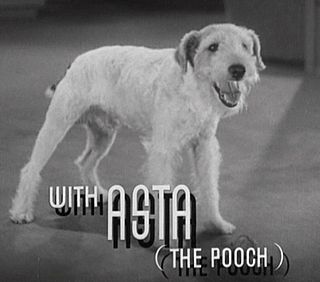
Skippy was a Wire Fox Terrier dog actor who appeared in dozens of movies during the 1930s. Skippy is best known for the role of the pet dog "Asta" in the 1934 detective comedy The Thin Man, starring William Powell and Myrna Loy, and for his role in the 1938 comedy Bringing Up Baby, starring Katharine Hepburn and Cary Grant. Due to the popularity of The Thin Man role, Skippy is sometimes credited as Asta in public and in other films.

Mr. Vertigo is a novel written by the American author Paul Auster. Faber & Faber first published it in 1994 in Great Britain. The book fits well in Auster's bibliography, which has reappearing themes like failure and identity and genres like absurdist fiction, crime fiction and existentialism.
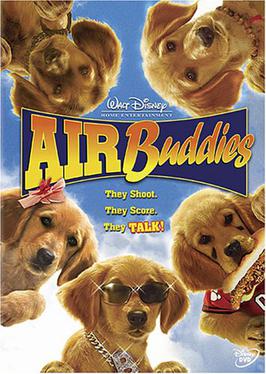
Air Buddies is a 2006 American sports comedy film directed by Robert Vince. It is the sixth film in the Air Bud series and the first in the direct-to-video spin-off series Air Buddies, which follows the life of a lonely teenager and his dog who has the uncanny ability to play every sport.
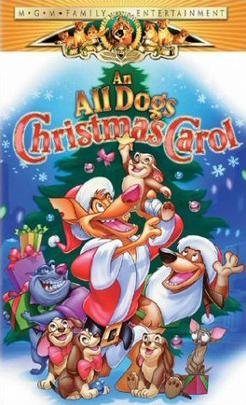
An All Dogs Christmas Carol is a 1998 direct-to-video animated musical television special based on the 1843 novella A Christmas Carol by Charles Dickens. The final installment in the All Dogs Go to Heaven film series, it also serves as the series finale to the animated series. Unlike the first two films, where the main characters are Charlie and Itchy, Carface is the focus of the story.
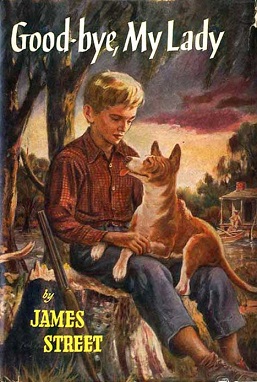
Good-bye, My Lady is a novel by James H. Street about a boy and his dog. It was published by J. B. Lippincott Company in June 1954 and reprinted in paperback by Pocket Books in February 1978. It is based on Street's short story "Weep No More, My Lady", which was published in the 6 December 1941 issue of The Saturday Evening Post.
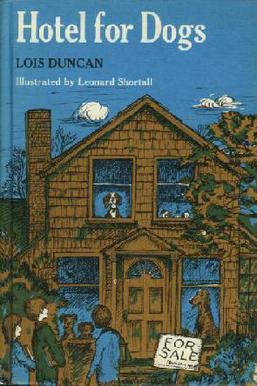
Hotel for Dogs (1971) is a children's novel by Lois Duncan. It was adapted into a film of the same name by Nickelodeon Movies for DreamWorks Pictures, released on January 16, 2009. When the book was originally released in 1971, Andi's name was Liz, and Friday's name was Sadie. To promote the film adaptation, the book was re-released on December 1, 2008 with various changes and modernization, such as Mrs. Walker, Andi's mother, revised to being a schoolteacher instead of a housewife.

Dogs Is Dogs is a 1931 Our Gang short comedy film directed by Robert F. McGowan. It was the 110th Our Gang short to be released.

The Call of the Wild: Dog of the Yukon is a 1997 Canadian film. The screenplay by Graham Ludlow is based on Jack London's classic 1903 novel The Call of the Wild, and is narrated by Richard Dreyfuss and stars Rutger Hauer.

The Pack is a 1977 American horror film directed by Robert Clouse about a pack of abandoned dogs who turn against humans by killing them for food at Seal Island.
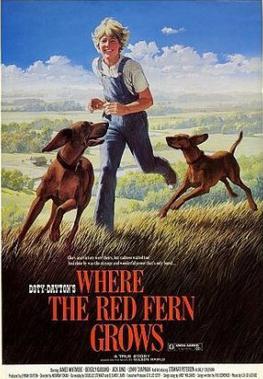
Where the Red Fern Grows is a 1974 drama film directed by Norman Tokar and starring James Whitmore, Beverly Garland, Stewart Petersen and Jack Ging. It is based on the 1961 novel of the same name.
Often an Orphan is a 1949 cartoon in the Merrie Melodies series. The cartoon was released on August 13, 1949 and stars Charlie Dog and Porky Pig.
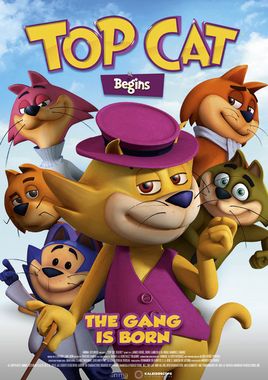
Top Cat Begins is a 2015 animated comedy film, produced by Ánima Estudios and distributed by Warner Bros. Pictures in Mexico. Based on the Hanna-Barbera animated television series Top Cat, this film is a prequel to both the series and the previous film, taking place before Top Cat met his gang.

A Dog's Journey is a 2019 American adventure comedy drama film directed by Gail Mancuso in her feature film directorial debut and written by W. Bruce Cameron, Cathryn Michon, Maya Forbes, and Wally Wolodarsky. The film is based on the 2012 novel of the same name by Cameron and is the sequel to the 2017 film A Dog's Purpose. The film stars Josh Gad, Dennis Quaid, Marg Helgenberger, Betty Gilpin, Kathryn Prescott, and Henry Lau.















